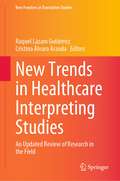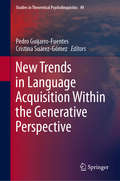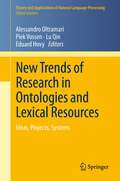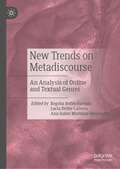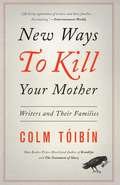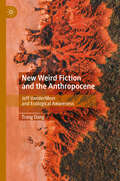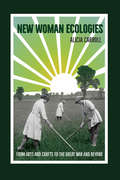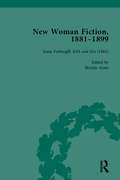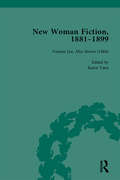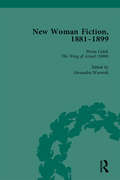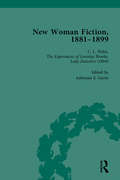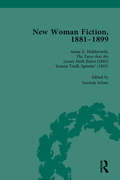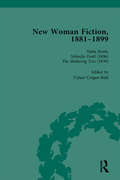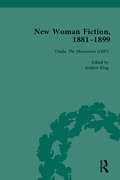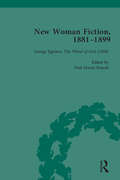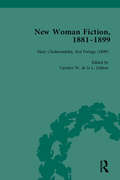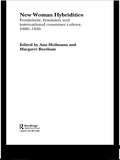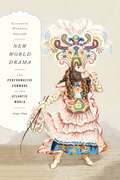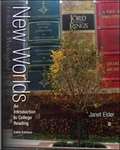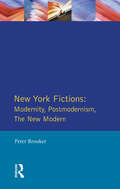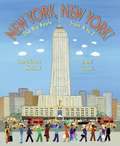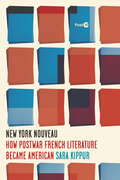- Table View
- List View
New Trends in Healthcare Interpreting Studies: An Updated Review of Research in the Field (New Frontiers in Translation Studies)
by Raquel Lázaro Gutiérrez Cristina Álvaro ArandaInterpreting studies have exponentially grown over the years propelled by the realities of multicultural societies which, among other factors, include constant waves of immigration and the subsequent allocation of newly arrived citizens in their host countries—a process entailing public service access and provision. Communicative interactions between users who do not speak the same language as public service providers have been largely studied in different settings belonging to the field Public Service Translation and Interpreting (PSIT), ranging from police, asylum, legal, educational or, focus of this book, healthcare contexts. This edited book offers a unique and updated insight into the research advances and the state of the art in healthcare interpreting. Contributions cover methodological innovations, together with hot topics, such as changing roles, gender, specialized contexts, training programs, and ethical codes, to name but a few.
New Trends in Language Acquisition Within the Generative Perspective (Studies in Theoretical Psycholinguistics #49)
by Pedro Guijarro-Fuentes Cristina Suárez-GómezThis book presents a comprehensive, state-of-the-art treatment of the acquisition of Indo- and Non-Indo-European languages in various contexts, such as L1, L2, L3/Ln, bi/multilingual, heritage languages, pathology as well as language impairment, and sign language acquisition. The book explores a broad mix of methodologies and issues in contemporary research. The text presents original research from several different perspectives, and provides a basis for dialogue between researchers working on diverse projects with the aim of furthering our understanding of how languages are acquired. The book proposes and refines new theoretical constructs, e.g. regarding the complexity of linguistic features as a relevant factor forming children’s, adults’ and bilingual individuals’ acquisition of morphological, syntactic, discursive, pragmatic, lexical and phonological structures. It appeals to students, researchers, and professionals in the field.
New Trends of Research in Ontologies and Lexical Resources
by Eduard Hovy Alessandro Oltramari Piek Vossen Lu QinIn order to exchange knowledge, humans need to share a common lexicon of words as well as to access the world models underlying that lexicon. What is a natural process for a human turns out to be an extremely hard task for a machine: computers can't represent knowledge as effectively as humans do, which hampers, for example, meaning disambiguation and communication. Applied ontologies and NLP have been developed to face these challenges. Integrating ontologies with (possibly multilingual) lexical resources is an essential requirement to make human language understandable by machines, and also to enable interoperability and computability across information systems and, ultimately, in the Web. This book explores recent advances in the integration of ontologies and lexical resources, including questions such as building the required infrastructure (e.g., the Semantic Web) and different formalisms, methods and platforms for eliciting, analyzing and encoding knowledge contents (e.g., multimedia, emotions, events, etc.). The contributors look towards next-generation technologies, shifting the focus from the state of the art to the future of Ontologies and Lexical Resources. This work will be of interest to research scientists, graduate students, and professionals in the fields of knowledge engineering, computational linguistics, and semantic technologies.
New Trends on Metadiscourse: An Analysis of Online and Textual Genres
by Begoña Bellés-Fortuño Lucía Bellés-Calvera Ana-Isabel Martínez-HernándezThis edited book gives an updated overview of methods of analysis of academic and non-academic genres in a digital era. The advent of digital and social media has deeply transformed academic and non-academic communication practices in the past two decades. The linguistic landscape is now a multilayered one; multicultural issues and cross-linguistic aspects are addressed in a way to understand how linguistically and culturally diverse identities try to find pathways. The communicative immediacy of digital media and the spectrum of genres/hybridized forms now available has inevitably influenced the way we communicate and the way we create meaning-making in a multimodal environment. The book contains nine chapters divided into two main sections corresponding to academic and non-academic texts where written, spoken and digital genres are examined from different perspectives. Cross-linguistic studies, multilingual approaches or disciplinary variations are analyzed in detail. This book provides and up-to-date and innovative view of Metadiscourse research and develops new research methodologies, drawing on visual research methods and combinations of qualitative and quantitative approaches from fields including Discourse Analysis, Corpus Linguistics, and Genre Analysis.
New Ways to Kill Your Mother
by Colm ToibinIn a brilliant, nuanced and wholly original collection of essays, the novelist and critic Colm Tóibín explores the relationships of writers to their families and their work. From Jane Austen's aunts to Tennessee Williams's mentally ill sister, the impact of intimate family dynamics can be seen in many of literature's greatest works. Tóibín, celebrated both for his award-winning fiction and his provocative book reviews and essays, and currently the Mellon Professor in the Humanities at Columbia, traces and interprets those intriguing, eccentric, often twisted family ties in New Ways to Kill Your Mother. Through the relationship between W. B. Yeats and his father, Thomas Mann and his children, and J. M. Synge and his mother, Tóibín examines a world of relations, richly comic or savage in its implications. In Roddy Doyle's writing on his parents, Tóibín perceives an Ireland reinvented. From the dreams and nightmares of John Cheever's journals, Tóibín illuminates this darkly comic misanthrope and his relationship to his wife and his children. "Educating an intellectual woman," Cheever remarked, "is like letting a rattlesnake into the house." Acutely perceptive and imbued with rare tenderness and wit, New Ways to Kill Your Mother is a fascinating look at writers' most influential bonds and a secret key to understanding and enjoying their work.
New Weird Fiction and the Anthropocene: Jeff VanderMeer and Ecological Awareness
by Trang DangThis book explores the development of ecological awareness in Jeff VanderMeer's New Weird novels, focusing specifically on the Southern Reach (2014-2024) and Borne (2017-2019) series. Examining the New Weird genre as an understudied part of climate fiction, the chapters investigate how these texts' language, content, and form develop unique and fascinating ways in which one can think and live more ecologically. As the first book-length study on VanderMeer's work to contextualize his novels through object-oriented ontology (OOO), an emerging branch of speculative philosophy that investigates how things exist, this work enables a uniquely experimental reading of VanderMeer: one that accentuates how his work unsettles what is perceived as normal and exposes the bounds of human reasoning, as well as how we understand ourselves and our relationships with nonhumans. Dang also engages with interdisciplinarity, situating VanderMeer's work within cultural discourse around the Anthropocene, environmental anthropology, prehistoric archeology, evolutionary biology, and Indigenous studies.
New Woman Ecologies: From Arts and Crafts to the Great War and Beyond (Under the Sign of Nature: Explorations in Ecocriticism)
by Alicia CarrollA transatlantic phenomenon of the late nineteenth and early twentieth centuries, the "New Woman" broke away from many of the constraints of the Victorian era to enjoy a greater freedom of movement in the social, physical, and intellectual realms. As Alicia Carroll reveals, the New Woman also played a significant role in environmental awareness and action.From the Arts and Crafts period, to before, during, and after the Great War, the iconic figure of the New Woman accompanied and informed historical women’s responses to the keen environmental issues of their day, including familiar concerns about air and water quality as well as critiques of Victorian floral ecologies, extinction narratives, land use, local food shortages, biodiversity decline, and food importation. As the Land Question intersected with the Woman Question, women contributed to a transformative early green culture, extolling the benefits of going back to the land themselves, as "England should feed her own people." Carroll traces the convergence of this work and a self-realization articulated by Mona Caird’s 1888 demand for the "acknowledgement of the obvious right of the woman to possess herself body and soul."By the early twentieth century, a thriving community of New Woman authors, gardeners, artists, and land workers had emerged and created a vibrant discussion. Exploring the early green culture of Arts and Crafts to women’s formation of rural utopian communities, the Women’s Land Army, and herbalists of the Great War and beyond, New Woman Ecologies shows how women established both their own autonomy and the viability of an ecological modernity.
New Woman Fiction, 1881-1899, Part I Vol 1
by Brenda Ayres Alexandra Warwick Carolyn W de la L Oulton Karen YuenContains three early examples of the genre of New Woman writing, each portraying women in ways wholly different to those which had gone before. This title includes "Kith and Kin" (1881), "Miss Brown" and "The Wing of Azrael".
New Woman Fiction, 1881-1899, Part I Vol 2
by Brenda Ayres Alexandra Warwick Carolyn W de la L Oulton Karen YuenContains three early examples of the genre of New Woman writing, each portraying women in ways wholly different to those which had gone before. This title includes "Kith and Kin" (1881), "Miss Brown" and "The Wing of Azrael".
New Woman Fiction, 1881-1899, Part I Vol 3
by Brenda Ayres Alexandra Warwick Carolyn W de la L Oulton Karen YuenContains three early examples of the genre of New Woman writing, each portraying women in ways wholly different to those which had gone before. This title includes "Kith and Kin" (1881), "Miss Brown" and "The Wing of Azrael".
New Woman Fiction, 1881-1899, Part II vol 4
by Vybarr Cregan-Reid Carolyn W de la L Oulton Adrienne E Gavin SueAnn SchatzCovers four texts from the 1890s that helped to crystallize the idea of the 'New Woman' during a period where the role of women was increasingly debated and challenged, not least due to the growth of the suffrage movement.
New Woman Fiction, 1881-1899, Part II vol 5
by Vybarr Cregan-Reid Carolyn W de la L Oulton Adrienne E Gavin SueAnn SchatzCovers four texts from the 1890s that helped to crystallize the idea of the 'New Woman' during a period where the role of women was increasingly debated and challenged, not least due to the growth of the suffrage movement.
New Woman Fiction, 1881-1899, Part II vol 6
by Vybarr Cregan-Reid Carolyn W de la L Oulton Adrienne E Gavin SueAnn SchatzCovers four texts from the 1890s that helped to crystallize the idea of the 'New Woman' during a period where the role of women was increasingly debated and challenged, not least due to the growth of the suffrage movement.
New Woman Fiction, 1881-1899, Part III vol 7
by Andrew King Paul March-Russell Carolyn W de la L OultonThe novels in this collection include one by a fierce opponent to the New Woman movement, as well as two from women whose work can be seen as archetypal New Woman fiction.
New Woman Fiction, 1881-1899, Part III vol 8
by Andrew King Paul March-Russell Carolyn W de la L OultonThe novels in this collection include one by a fierce opponent to the New Woman movement, as well as two from women whose work can be seen as archetypal New Woman fiction.
New Woman Fiction, 1881-1899, Part III vol 9
by Andrew King Paul March-Russell Carolyn W de la L OultonThe novels in this collection include one by a fierce opponent to the New Woman movement, as well as two from women whose work can be seen as archetypal New Woman fiction.
New Woman Hybridities: Femininity, Feminism, and International Consumer Culture, 1880–1930 (Routledge Transnational Perspectives on American Literature #Vol. 1)
by Ann Heilmann Margaret BeethamSince the 1970s, the literary and cultural politics of the turn-of-the-century New Woman have received increasing academic attention. Whether she is seen as the emblem of sexual anarchy, an agent of mediation between mass market and modernist cultures, or as a symptom of the consolidation of nineteenth and early twentieth-century political liberation movements, the New Woman represents a site of cultural and socio-political contestation and acts as a marker of modernity. This book explores the diversity of meanings ascribed to the New Woman in the context of cultural debates conducted within and across a wide range of national frameworks including the UK, Canada, North America, Europe, and Japan. The key concept of 'hybridities' is used to elucidate the national and ethnic multiplicity of the 'modern woman' as well as to locate this figure both within international consumer culture and within feminist writing. The book is structured around four key themes. 'Hybridities' examines the instabilities of New Woman identities and discourses in relation to both national/ethnic contexts and the textual parameters of New Woman writings. 'Through the (Periodical) Looking Glass' is concerned with the periodical press and its production and circulation of New Woman images. 'Feminist Counter Cultures?' interrogates feminist efforts to influence and shape this process by mimicking or subverting dominant models of representation and by establishing alternative spaces for the articulation of New Woman subjectivities. 'Race and the New Woman' inspects white New Women's investment in hegemonic racial discourses, looking at the way in which black and non-Western women inserted liberationist discourses into the New Woman debate. This book will be essential reading for advanced students and researchers of American Studies, Women's Studies, and Women's History.
New World Drama: The Performative Commons in the Atlantic World, 1649–1849
by Elizabeth Maddock DillonIn New World Drama, Elizabeth Maddock Dillon turns to the riotous scene of theatre in the eighteenth-century Atlantic world to explore the creation of new publics. Moving from England to the Caribbean to the early United States, she traces the theatrical emergence of a collective body in the colonized New World--one that included indigenous peoples, diasporic Africans, and diasporic Europeans. In the raucous space of the theatre, the contradictions of colonialism loomed large. Foremost among these was the central paradox of modernity: the coexistence of a massive slave economy and a nascent politics of freedom. Audiences in London eagerly watched the royal slave, Oroonoko, tortured on stage, while audiences in Charleston and Kingston were forbidden from watching the same scene. Audiences in Kingston and New York City exuberantly participated in the slaying of Richard III on stage, enacting the rise of the "people," and Native American leaders were enjoined to watch actors in blackface "jump Jim Crow." Dillon argues that the theater served as a "performative commons," staging debates over representation in a political world based on popular sovereignty. Her book is a capacious account of performance, aesthetics, and modernity in the eighteenth-century Atlantic world.
New World Irish
by Jack MorganThe book concerns the new World Irish, tracing the developing profile of the Irish in America from the Famine forward. The studies draw their material from roughly a one-hundred-year arc of Irish presence and relevance in American life and they would serve as American as well as Irish-American studies.
New Worlds: An Introduction to College Reading
by Janet ElderCONNECT READING provides a personalized learning plan for each student, continually developed and refined as students achieve mastery. Each student plan is created through an individualized diagnostic that evaluates skills from 7th-grade level through college-readiness, for second-language learners, international students, adult students, and traditional high-schoolers. Offered completely online, CONNECT READING can be used in conjunction with NEW WORLDS or OPENING DOORS, which provide a printed experience that teaches critical reading skills through close reading of anthologized chapters from best-selling undergraduate texts in Psychology, Sociology, Business, and more.
New York Coach, Supporting the Standards: Target: Reading Comprehension
by Triumph LearningImprove your reading comprehension skills and word recognition with stories, poetry and other selections of exciting reading.
New York Fictions: Modernity, Postmodernism, The New Modern (Longman Studies In Twentieth Century Literature)
by Peter BrookerIn this original study, Peter Brooker takes issue with the simplified opposition of postmodernism to modernism in accounts of the modern period. Instead, he follows the course of modernity in the spectacular example of New York, to reveal the complexities of both modernist and postmodern responses to the city. Brooker's study refers us to the fiction of Doctorow, Don DeLillo and Toni Morrison and especially to the new urban `ethnic' writing. Here the voice of creative dissent and cultural hybridity expresses the best in a tradition of Amerian newness; this Peter Brooker calls the `new modern'. The text is an important contribution to contemporary debates on modernism and postmodernism, providing a thorough interdisciplinary study of new American writing within the socio-economic context of New York City and will be of great interest to students of American Studies, Cultural Studies and Literature.
New York New York: The Big Apple From A To Z
by Laura KraussA sneak peek at the important landmarks of New York.
New York Nouveau: How Postwar French Literature Became American (Post*45)
by Sara KippurPostwar French writers were at the vanguard of global literary innovation—from the experimental minimalism of the Nouveau Roman to the literary games of the OuLiPo—but less often appreciated is the extent to which they worked closely with US editors and translators, published actively with American presses, and often theorized transatlantic connections within their work. In this exciting new work, Sara Kippur proposes a new French literary history that traces the deep connections between postwar literary experimentalism and the New York publishing industry, compellingly arguing that US-based editors, publishers, producers, professors, and translators crucially intervened to shape French literature. While Kippur attends closely to well-known writers such as Marguerite Duras, Samuel Beckett, Eugène Ionesco, Georges Perec, and Alain Robbe-Grillet, she also amplifies the voices of those who have been less visible, though no less relevant, including women whose contributions have not received proper credit but who helped to foster a sense of new possibilities for twentieth-century French writing. With these untold histories, stitched together in this book through new archival discoveries from special collections and personal archives on both sides of the Atlantic, Kippur begins to dismantle rigid notions of canonicity, authorship, and national literature.
New York Performance Assessment Grade 9
by Houghton Mifflin HarcourtStudent and teacher resources implement a three-step approach--Analyze the Model, Practice the Task, and Perform the Task--building the high-level skills students need to succeed.
